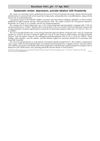 April 2021 in “Reactions Weekly”
April 2021 in “Reactions Weekly” Finasteride increases risk of depression, possibly suicidal thoughts, and sexual dysfunction.
 40 citations,
December 2019 in “Neurobiology of Stress”
40 citations,
December 2019 in “Neurobiology of Stress” Neuroactive steroids show promise for treating mental and neurological disorders by targeting GABA_A receptors.
7 citations,
April 2021 in “Journal of Clinical Psychopharmacology” Finasteride may increase the risk of depression, anxiety, and suicidal thoughts.
4 citations,
October 2023 in “Journal of clinical medicine” Women with PCOS are much more likely to experience depression.
1 citations,
May 2024 in “Journal of Clinical Medicine” Depression and skin autoimmune diseases are linked, needing combined care for better treatment.
 23 citations,
April 2017 in “Clinical, Cosmetic and Investigational Dermatology”
23 citations,
April 2017 in “Clinical, Cosmetic and Investigational Dermatology” Dermatologists should screen for and manage psychological issues in patients with skin conditions to improve their quality of life.
 90 citations,
March 2017 in “JAMA Internal Medicine”
90 citations,
March 2017 in “JAMA Internal Medicine” Men over 66 taking medication for prostate enlargement have a higher risk of depression and self-harm, especially in the first 18 months of treatment.
 85 citations,
August 2018 in “Psychological Medicine”
85 citations,
August 2018 in “Psychological Medicine” Women with PCOS are more likely to suffer from depression, anxiety, and stress.
 29 citations,
October 2020 in “Journal of the European Academy of Dermatology and Venereology”
29 citations,
October 2020 in “Journal of the European Academy of Dermatology and Venereology” Women with high androgen levels may have more severe COVID-19 symptoms.
 1 citations,
September 2017 in “Frontiers in Laboratory Medicine”
1 citations,
September 2017 in “Frontiers in Laboratory Medicine” Gut flora changes could potentially indicate depression, but more research is needed.
 June 2023 in “International journal of biology, pharmacy and allied sciences”
June 2023 in “International journal of biology, pharmacy and allied sciences” New medications are improving depression treatment, emphasizing accurate diagnosis and chronic care.
 251 citations,
October 2014 in “The Journal of Clinical Endocrinology & Metabolism”
251 citations,
October 2014 in “The Journal of Clinical Endocrinology & Metabolism” The guidelines advise against using testosterone and DHEA in women for most conditions due to safety and effectiveness concerns, but suggest considering testosterone for postmenopausal women with low sexual desire.
 2 citations,
January 2023 in “Research Square (Research Square)”
2 citations,
January 2023 in “Research Square (Research Square)” Managing emotional distress, obesity, insulin resistance, and high male hormones is crucial for improving well-being in women with PCOS.
 254 citations,
September 2014 in “Menopause”
254 citations,
September 2014 in “Menopause” The NAMS 2014 recommendations guide healthcare providers on treating health issues in midlife women, emphasizing individualized care and informed decision-making.
 48 citations,
February 2014 in “Fertility and Sterility”
48 citations,
February 2014 in “Fertility and Sterility” Women with PCOS often have hair loss, which is linked to acne or excess body hair but not to worse hormone or metabolic issues.
1 citations,
August 2017 in “The Journal of urology/The journal of urology” 5α-reductase inhibitors may increase the risk of depression and suicidal thoughts.
 10 citations,
March 2018 in “Anais Brasileiros De Dermatologia”
10 citations,
March 2018 in “Anais Brasileiros De Dermatologia” More hair loss leads to higher risk of psychosexual disorders, especially in women.
 45 citations,
February 2019 in “Journal of Affective Disorders”
45 citations,
February 2019 in “Journal of Affective Disorders” Melatonin improved mental health and metabolism in women with PCOS.
 29 citations,
March 2017 in “International Journal of Women's Dermatology”
29 citations,
March 2017 in “International Journal of Women's Dermatology” Hormone therapies like birth control pills and spironolactone are safe and effective for treating women's adult acne.
 2 citations,
June 2011 in “Expert Review of Dermatology”
2 citations,
June 2011 in “Expert Review of Dermatology” Female pattern hair loss involves thinning hair on crown and frontal scalp, diagnosed by hair ratio, and treated with minoxidil, antiandrogens, or hair transplantation.
 31 citations,
March 2017 in “Journal of The American Academy of Dermatology”
31 citations,
March 2017 in “Journal of The American Academy of Dermatology” Some breast cancer patients developed permanent hair loss after chemotherapy and hormonal therapy, showing patterns similar to common baldness and alopecia areata.
 9 citations,
April 2021 in “Expert opinion on pharmacotherapy”
9 citations,
April 2021 in “Expert opinion on pharmacotherapy” Clascoterone is a new, effective, and safe acne treatment without systemic side effects.
 December 2023 in “Health Information Jurnal Penelitian”
December 2023 in “Health Information Jurnal Penelitian” Post-COVID syndrome causes long-lasting symptoms like fatigue, breathing issues, and anxiety.
 December 2018 in “Actas urológicas españolas”
December 2018 in “Actas urológicas españolas” 5-alpha reductase inhibitors may have additional effects on cancer, mental health, heart health, and hormone levels beyond treating prostate enlargement.
 11 citations,
August 2019 in “The Journal of Sexual Medicine”
11 citations,
August 2019 in “The Journal of Sexual Medicine” Women with nonclassic congenital adrenal hyperplasia experience more sexual dysfunction and distress.
 5 citations,
March 2018 in “Advances in integrative medicine”
5 citations,
March 2018 in “Advances in integrative medicine” A 23-year-old woman with Hashimoto’s thyroiditis improved significantly after a 15-month integrative treatment plan.
 November 2024 in “Frontiers in Medicine”
November 2024 in “Frontiers in Medicine” Cirrhosis affects quality of life with various symptoms, requiring a holistic, multidisciplinary approach for management.
7 citations,
April 2021 in “Journal of Bodywork and Movement Therapies” Recognizing and managing central sensitization and stress is crucial for treating chronic pain.
1 citations,
April 2022 in “Journal of Cosmetic Dermatology” Androgenetic alopecia causes significant psychological distress, especially in women, and requires both medical and psychological support.
 13 citations,
September 2011 in “American Journal of Clinical Dermatology”
13 citations,
September 2011 in “American Journal of Clinical Dermatology” The oral contraceptive ethinylestradiol/chlormadinone acetate is effective in reducing acne and improving other skin conditions related to high androgen levels.
























